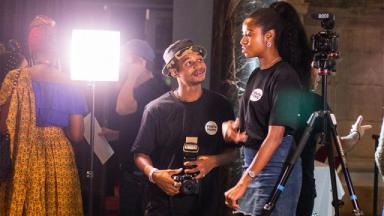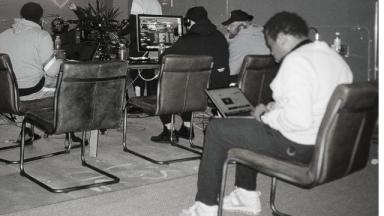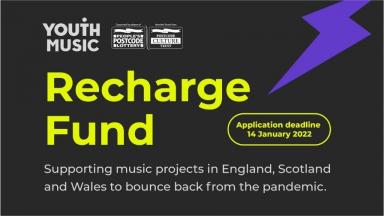
Written By Angela Linton, Chief Operating Officer
Working with young people every day at Youth Music we are all too aware of how they are disproportionately affected by low wages and unpaid work. The ongoing pandemic has, in many ways, impacted them the hardest. And it has only reinforced our belief that organisations have a responsibility to pay the Real Living Wage and change unfair practices.
While young people are affected by low pay in all sectors, the music industry is rife with exploitation and poor working practices. Despite improvements, unpaid internships remain. It’s an issue which creates barriers that prevent many young people from getting a foothold in the industry and progressing their careers, particularly those with less financial means and those from outside London.
Recently the government announced that the National Living Wage will increase from £8.91 to £9.50 for workers aged twenty-three and over next year, and for those aged twenty-one to twenty-two the minimum will increase from £8.36 to £9.18. The problem is that many are facing tax rises, rent increases, cuts to universal credit, and rising energy bills.
These issues are not felt exclusively by people over the age of twenty-five. And in fact, it is independent living young people, who do not have the security of being able to live at home, who are more likely to be establishing themselves in their careers, living at the mercy of landlord rent hikes, and who feel the greatest impact of the rising cost of living.
While we recognise the government’s National Living Wage boost is a step in the right direction, it doesn’t take into account the real cost of living. The Real Living Wage, on the other hand, is the only UK wage rate voluntarily paid by almost 9,000 UK businesses which meets every day basic needs like the weekly shop, or an unplanned trip to the dentist (if you can get a local appointment!).
We know the driving factors affecting whether young people get a foot in the door, gain meaningful experiences, and stay employed are gender, class, ethnicity, and geographical location. These barriers often intersect and have been magnified by the ongoing pandemic. The thread running through all of them, however, is access to finance.
These longstanding inequalities were highlighted by our research, A Blueprint for the Future, which found that:
- People from lower income backgrounds are less likely to be earning through music, have fewer networking opportunities, and are less likely to have help or be mentored by people in the industry
- Women are less likely to be earning through music than men, and have less access to support to help them achieve success in the music industries
- People from Black, Asian, Mixed and Minority Ethnic ethnicities backgrounds find gaining experience in the industry harder, and have less access to unpaid internships than people who are white
- Young people in England are more likely to be earning in music than those in Wales or Scotland
To address these inequalities and for impact to be felt, it’s important that more organisations sign up. We need change on an industry-wide scale. As well as engaging young people directly through internships and freelance work, part of our role at Youth Music involves advocacy, both with the organisations we support, and with our partners in the cultural and funding sectors. As a direct impact of this work we were thrilled to see our partners Arts Council England commit to becoming a Real Living Wage employer in 2019.
The arts and culture sector is facing many financial challenges, and it’s understandable that there is sometimes resistance to increasing pay. Not all organisations have the financial capacity, particularly small arts organisations. That’s why we support and advocate for the Living Wage Foundation’s Living Hours campaign, which allows employers to adopt the Living Wage rates for contract staff.
There really is no excuse to ask young people to work for free or for below what we ourselves would expect. The music industry has long taken advantage of young people’s passion for music, expecting those keen on pursuing a career in the sector to work for free, or for less, in the hope of securing a ‘dream job’.
It’s time we stop viewing young people as ‘other’. Age is just a number and anyone doing a day’s work deserves a fair rate of pay.
This article originally appeared in MUSIC:ED
You may also like...
The importance of being paid for creative work
We spoke to young creatives who worked in roles at the Youth Music Awards 2019 about what it meant to them to get paid for their work.
Opportunities Board
Discover early stage jobs in the music industry, as well as opportunities to perform, develop skills and gain experience.
Incubator Fund Round Three Grant Recipients
We're backing 27 more organisations through the Youth Music #IncubatorFund - opening up sustainable careers in music for people aged 18-25. Explore the creative employers incubating new and diverse talent with grants of up to £30k.
Recharge Fund
The Youth Music Recharge Fund offers grants of up to £90k (max £30k per year) to boost organisations in their post-covid recovery.




